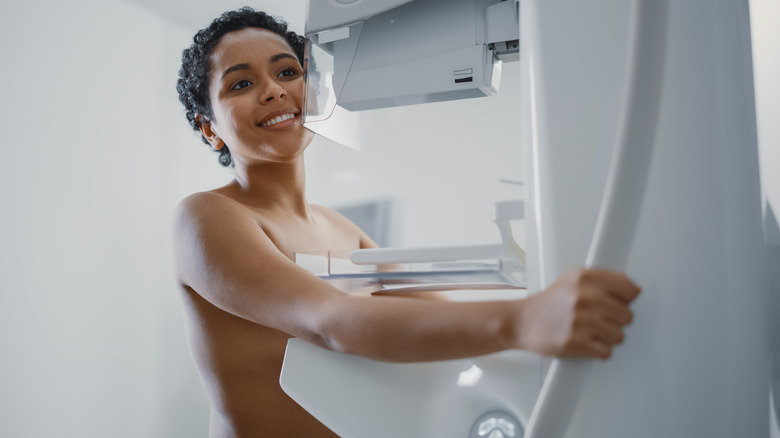Study Reveals Mammograms Have A Second Superpower
Mammograms are an important part of breast cancer screening and prevention. According to the American Cancer Society, women should be given the option to start mammograms beginning at age 40, with yearly screenings recommended to begin at 45.
During a mammogram, your breast is compressed between two plates on an x-ray machine, allowing for a clear image of any possible areas where there may be abnormalities, per the Centers for Disease Control and Prevention (CDC). Some women may hesitate to get their annual mammogram due to feeling exposed as well as the physical discomfort involved with the procedure itself. But the benefits of early detection that mammograms offer far outweigh any temporary unpleasantness or embarrassment you may feel (via CDC).
According to Dr. Sarah Zeb, a breast imaging specialist at Johns Hopkins Medical Imaging, "Having a mammogram every year increases the chance of detecting cancer when it is small and when it is most easily treated which also improves survival" (per Johns Hopkins Medicine).
Beyond early detection, a new study is showing that the lifesaving power of mammograms now has an added bonus.
The newly discovered benefit of mammograms
A 2022 study published in the American Heart Association's journal, Circulation: Cardiovascular Imaging, reported that annual mammograms might detect not only breast cancer but also heart disease. As it turns out, mammograms can show calcium buildup in the arteries of the breast, also known as breast arterial calcification (BAC), which may help to predict heart disease, per the American Heart Association (AHA).
In the study, a group of 5,059 women ages 60-79 with no prior history of cardiovascular problems underwent mammograms for a period of three years. Results showed that women with this calcium buildup had a 51% higher chance of developing heart disease (via U.S. News & World Report).
According to Dr. Natalie Avella Cameron, a physician at Northwestern Medicine, these findings are an important step for potentially carving out a new detection system for heart disease. She pointed out to U.S. News & World Report, "If future research shows that BAC improves heart disease risk prediction among women not yet on cholesterol-lowering medications, BAC could serve as a powerful tool to help guide heart disease prevention for the millions of women who undergo routine mammography each year."


